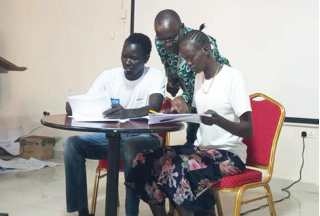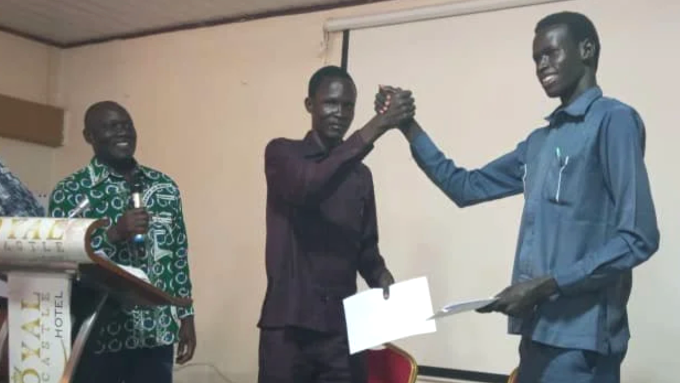Enabling young people to lead change and build peace
Where young people are seen to be part of the problem, we’re helping them become part of the solution.
The Concordis team in Abyei has been in a lengthy peacebuilding process with the communities of the Twic (say Twitch) Dinka and the Ngok (say Knock) Dinka. Both groups have traditional land rights in the area: consequently, relationships are complicated, fragile and prone to violence.
Young people often find themselves in an invidious position. They’re blamed for the violence but called upon by elders to defend communities. When conflict between Twic and Ngok ignited in 2022, many young people found themselves on the front line as members of armed groups.
As the intensity of the conflict increased, the town of Agok was destroyed, making 50,000 people homeless. Armed groups burnt the market to the ground, creating a no-man's-land between them, but also destroying their trading place and only point of interaction.
These young people are the future of Abyei. To intervene and bring change here has profound impact. Since the outbreak of this conflict, we've worked quietly with young people from all sides, helping them move beyond the inflammatory political rhetoric and to identify what they truly want and need.
In March 2025, the process paid off at an unprecedented youth peace conference. We are enormously encouraged by what has happened here. We enabled 100 young people - armed and unarmed members of the two communities – to come to a place called Wau (say Wow) in Twic County, South Sudan. They took considerable risks to travel there, given the high tensions across the region.
It was a friendly gathering because, thanks to preparation by Concordis, these young people were ready to talk about changing their aggression towards each other. They even played football in mixed teams. The first thing that happened was the leaders of the opposing armed groups realised they were cousins - their mothers are sisters - but they hadn't known the other was leading their armed group. They addressed each other as ‘cousin’. This was the open door needed for trust and change: we are family, albeit a complicated one.
Stephen Mou, Abyei Project Manager, was present at the conference. He reports that:
"When the two young men met, they were surprised to find the other as a leader, but they were smiling so much at their cousin, and then they talked and talked and talked. I felt bad that the conflict had divided these relations to the extent that they didn't know what the other side of the family was doing. It was a joy to see them reunited and hear them speaking from their hearts. It was a joy to hear them say they want their elders not to fight, to hear them address their differences around the table, to agree to come to each others' aid when they feel overwhelmed. They all have relatives who have been killed in wars, so emotions will still run high for a while until we have got the message out to the wider community and cooled the temperature of the conflict."
And Stephen smiles broadly.
We don’t say “unprecedented” lightly: this remarkable conversation ended with a signed peace agreement, which has held.
There were four things agreed upon:
We will cease hostilities between each other. As protectors of our communities, we will stop seeing one another as a threat and support each other against greater threats in the region.
We will attempt to stop misinformation and hate speech by identifying social media sites that are aggravating the situation, and those who put out demoralising, inflammatory messages during the conference. They asked for help to reinstate two radio stations that had been trusted to put out accurate information. More than just address misinformation, they want to have positive communication between the two communities.
We will support freedom of movement of people and goods, so that there can be intercommunity trade which will build relationships and livelihoods, creating work for our young people too.
We will see this through. We have since helped them to disperse the news of the conference to the wider community, particularly in rural areas. They want further conferences, for the women and the elders to meet too.
This is how change happens in communities paralysed by violence.
Later in 2025, there was more good news on the impact of the conference. These same young people have resumed trading at the Agok market (not to be confused with the Amiet peace market further north, for Misseriya and Ngok Dinka groups).
Revenue collection at this market used to be a source of conflict between Twic and Ngok groups. It was burned to the ground and the area became a no-man’s land, a buffer zone between the conflicting tribes. Now the market is run by a semi-structured youth committee from both sides. They are no longer left out or considered illegitimate in the peace process. Even the armed youth have been drawn in and, putting their weapons down, now see the market as a provider of honest work. They are listening to each other’s feedback.
This is future proofing.
We need peace to trade. And then trade can work as an incentive to keep the peace.
“We can’t wait for peace to come from Juba or Khartoum. We must build it here - in the market, in our grazing lands, in how we treat each other.”
Would you help? Click here to give to Concordis.



